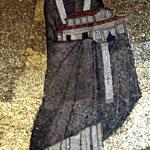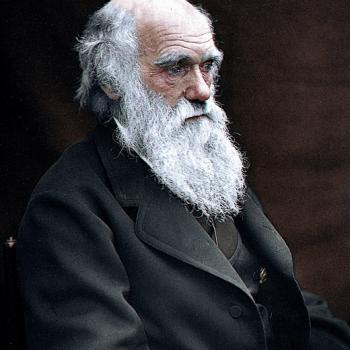
Science, logic, and mathematics all begin from unprovable axioms.
In other words, one must exercise a sort of faith to accept those without initial evidence, and then proceed: scarcely different in these respects from religious tenets.
For science:
The universe:
1. is rational and logical
2. is contingent (has cause and effect)
3. is objective (it exists independently of us)
4. is unified
5. operates in a consistent, uniform manner (uniformitarianism).
6. is able to be learned via our senses, and that they convey to us accurate data
Philosopher Alfred North Whitehead (1861-1947) wrote in 1925:
In the first place, there can be no living science unless there is a widespread instinctive conviction in the existence of an Order Of Things. And, in particular, of an Order Of Nature . . . The inexpugnable belief that every detailed occurrence can be correlated with its antecedents in a perfectly definite manner . . . must come from the medieval insistence on the rationality of God . . .
My explanation is that the faith in the possibility of science, generated antecedently to the development of modern scientific theory, is an unconscious derivative from medieval theology.
The faith in the order of nature that has made possible the growth of science is a particular example of a deeper faith. This faith cannot be justified by any inductive generalisation. It springs from direct inspection of the nature of things as disclosed in our immediate present experience. (Science and the Modern World, reprinted by Free Press, 1997, 3-4, 13, 18)
Philosopher of science, Thomas Kuhn (1922-1996), elucidated the medieval background in his book, The Copernican Revolution (New York: Vintage Books / Random House, 1959):
After the Dark Ages the Church began to support a learned tradition as abstract, subtle, and rigorous as any the world has known . . . The Copernican theory evolved within a learned tradition sponsored and supported by the Church . . . (p. 106)
The centuries of scholasticism are the centuries in which the tradition of ancient science and philosophy was simultaneously reconstituted, assimilated, and tested for adequacy. As weak spots were discovered, they immediately became the foci for the first effective research in the modern world. The great new scientific theories of the sixteenth and seventeenth centuries all originate from rents torn by scholastic criticism in the fabric of Aristotelian thought. Most of those theories also embody key concepts created by scholastic science. And more important than these is the attitude that modern scientists inherited from their medieval predecessors: an unbounded faith in the power of human reason to solve the problems of nature. (p. 123)
Loren Eiseley (1907-1977), an anthropologist, educator, philosopher, and natural science writer, who received more than 36 honorary degrees, and was himself an agnostic in religious matters, observed:
It is the Christian world which finally gave birth in a clear articulated fashion to the experimental method of science itself . . . It began its discoveries and made use of its method in the faith, not the knowledge, that it was dealing with a rational universe controlled by a Creator who did not act upon whim nor inference with the forces He had set in operation. The experimental method succeeded beyond man’s wildest dreams but the faith that brought it into being owes something to the Christian conception of the nature of God. It is surely one of the curious paradoxes of history that science, which professionally has little to do with faith, owes its origins to an act of faith that the universe can be rationally interpreted, and that science today is sustained by that assumption. (Darwin’s Centenary: Evolution and the Men who Discovered it, New York: Doubleday: 1961, 62)
See also:
Christian Influence on Science (Copious Resources)
*****
Mathematics is unfalsifiable:
Hilary Putnam (philosopher), Words and Life (edited by James Conant, Harvard University Press, 1995, p. 258):
[A]s a matter of descriptive fact about our present cognitive situation, we do not know of any possible situation in which the truths of mathematics (as we take them to be) would be disconfirmed, save for situations in which the meanings of terms are (by our present lights) altered. To insist that these statements must be falsifiable, or that all statements must be falsifiable — is to make falsifiability a third (or is it a fourth by now?) dogma of empiricism.
For more on that and for logical positivism, see:
*****
For logic:
From: The Laws of Classical Logic:
The Axioms of Classical Logic|
The Law of Identity: Metaphysically, this law asserts that “A is A” or “anything is itself.” For propositions: “If a proposition is true, then it is true.”
The Law of the Excluded Middle: Metaphysically, this law asserts “anything is either A or not A.” For propositions: “A proposition, such as P, is either true or false.” We also refer to such statements as “tautologies”
The Law of Noncontradiction: Metaphysically, this law asserts:: “Nothing can be both A and not-A.” For propositions: “A proposition, P, can not be both true and false.”
All of our syllogisms rely on these laws – that any thing is equal to itself, that tautologies must be true, and that contradictions must be false. Classical logic holds that everything has a definite, non-contradictory nature. A metaphysical law of identity would hold that to be perceived or even exist at all it must have a definite, non-contradictory nature.
Self Evident Nature of Axioms
Seeing as axioms are the foundation to classic logic, it is not possible to use classical logic to justify them anymore than it would be possible to use a building’s second floor as its foundation. Any attempt to do so is doubly folly, seeing as the axioms of logic, as well as logic itself, is prescriptive, not descriptive. It’s not a element of the universe that we need to verify as true or false, it is a system. In addition, any natural attempt to give logic a psychological justification would be viciously circular, since all reasoning, including that to produce the justification, already assumes the validity of logical rules of inference.
Finally, Aristotle found any attempt to logically justify axioms as unnecessary: he held that the axioms of classical logic are self evident. It was said that they are are self evident because 1) all syllogisms rely on them, and 2) because they can be defended through retortion.
***
Photo credit: Philosopher Hilary Putnam (1926-2016) [Wikimedia Commons / Creative Commons Attribution-Share Alike 2.5 Generic license]
***












